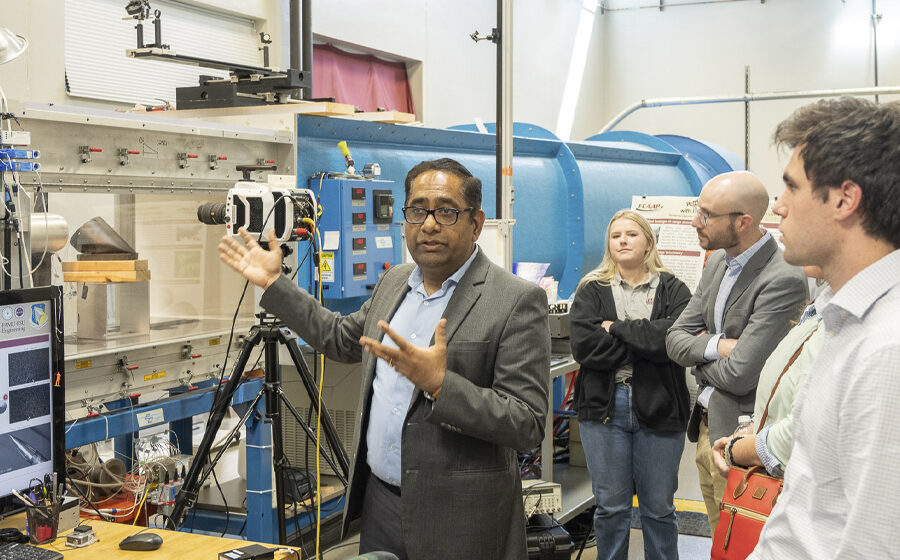Air Force Awards $5M to FAMU-FSU College of Engineering, University of Florida Collaboration on New Research Center of Excellence

By: Bill Wellock and Helen Goh
TALLAHASSEE, Fla. — The FAMU-FSU College of Engineering and the Herbert Wertheim College of Engineering at the University of Florida will collaborate on a new Air Force Office of Scientific Research Center of Excellence focused on high-speed flight and morphing aerospace vehicles, which can change shape while in flight.
The Florida State University-headquartered Florida Center for Advanced Aero-Propulsion (FCAAP) will manage the center, named “AEROMORPH: Aerospace Morphing via Integrated Sense, Assess and Respond.” The Air Force Research Laboratory (AFRL) and Air Force Office of Scientific Research awarded the universities $5 million for the project.
Researchers will conduct fundamental research into morphing structures, conventional distributed sensing, state estimation and control systems that are crucial to aerospace morphing technology.
“This new Center of Excellence on morphing structures for aerospace applications will significantly enhance our research collaboration with the FCAAP partner institutions and Air Force Research Laboratories,” said FCAAP Director Rajan Kumar. “The consortium will allow our students, postdoctoral researchers and faculty to interact with AFRL engineers and scientists and develop technologies for next-generation high-speed flight vehicles.”

The interdisciplinary work will combine insights from information theory, network science, fluid-structure interactions, experimental aerodynamics and other disciplines.
“I am very excited to see this multidisciplinary team from FAMU-FSU and UF working together with the U.S. Air Force to solve fundamental problems associated with high-speed morphing aircraft,” said UF Mechanical and Aerospace Engineering Department (MAE) Chair Warren Dixon.

The research has both military and civilian applications.
“This has potential commercial use for advanced aircraft as well as energy systems to advance wind power and gas turbines,” said William Oates, chair of the FAMU-FSU Department of Mechanical Engineering. “We want to develop technology that tightly integrates computations into aerodynamic morphing structures for better control and agility.”
In addition to the research-specific goals of advancing the intelligence and agility of next-generation aircraft systems, the center will provide unique opportunities for students to work with world-class experimental facilities. The Center of Excellence program is a prime opportunity for academic engagement, mentorship and a pipeline for students to become highly skilled researchers.
“This facility and partnership will serve as the nexus for designing, modeling and testing integrated aerospace systems and structures,” Oates said. “It will support students and faculty, promote discovery of new intelligent aerospace systems, and help create a workforce of aerospace engineers for the Air Force Research Laboratory and industry partners.”

The center’s work will be crucial to developing next-generation aerospace systems that can function at hypersonic speeds — five times the speed of sound — which the U.S. Air Force values for national security and air superiority.
“The faster things move, the faster they need to think,” said Christian Hubicki, an assistant professor in the FAMU-FSU Department of Mechanical Engineering. “Fast and adaptive decision-making is crucial to the success of this project, which is something we have been developing in robotics for years.”
Key investigators from the UF team include Patrick Musgrave, an assistant professor at MAE; Ryan Gosse, a professor of practice at Florida Applied Research in Engineering; Mark Sheplak, a professor at the Department of Electrical and Computer Engineering; and Larry Ukeiley, a professor and associate chair of Academic Affairs at MAE.



